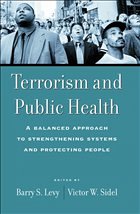In a wide-ranging, timely discussion of urgent issues, this volume examines the health consequences of the recent terrorist attacks in the United States and systematically reviews information on explosives, incendiaries, and small arms, as well as biologic, chemical, nuclear, radiologic and other radioactive weapons that may be used by terrorists. In a constructive approach, the authors discuss what needs to be done to improve the public health and medical care systems in perparation for possible future terrorist attacks and threats and for addressing widespread public health problems more effectively. They also explore the origins of terrorism and discuss the civil rights and human rights issues related to government responses to terrorism. Well-written, well-organized, and up-to-date, the book should be essential reading for many health professionals, students, and others concerned with terrorism and its health consequences.
Review quote:
This book deals with the perils and pitfalls of rushing into antiterrorist actions, whether from the public health or "homeland security" point of view... In sum this book addresses terrorism as a many-sided phenomenon. There are no easy answers either technically or politically, although the public health community has the responsibility to address them all in preventive aspect, politically, morally and from the point of view of social justice. For combining all of these perspectives, the editors, and the American Public Health Association, the book's sponsor, should be congratulated. (UK Public Health Association Newsletter)
. . . an important and urgently essential addition to the literature on this all too topical issue . . . Richly informative and practically inspiring, this book merits the widest possible readership and application. (RoSPA Occupational Safety and Health Bulletin)
This well-written, up-to-date book presents a balanced, comprehensive approach to strengthening health systems and protecting people from terrorism. It covers the health consequences of the terrorist attacks in the United States and what has been learned from them. The authors systematically review various types of terrorist weapons, including biological, chemical, nuclear, radiologic and other radioactive weapons, and they describe ways that the public health and medical care systems can be improved, while protecting civil rights and human rights.
Review quote:
This book deals with the perils and pitfalls of rushing into antiterrorist actions, whether from the public health or "homeland security" point of view... In sum this book addresses terrorism as a many-sided phenomenon. There are no easy answers either technically or politically, although the public health community has the responsibility to address them all in preventive aspect, politically, morally and from the point of view of social justice. For combining all of these perspectives, the editors, and the American Public Health Association, the book's sponsor, should be congratulated. (UK Public Health Association Newsletter)
. . . an important and urgently essential addition to the literature on this all too topical issue . . . Richly informative and practically inspiring, this book merits the widest possible readership and application. (RoSPA Occupational Safety and Health Bulletin)
This well-written, up-to-date book presents a balanced, comprehensive approach to strengthening health systems and protecting people from terrorism. It covers the health consequences of the terrorist attacks in the United States and what has been learned from them. The authors systematically review various types of terrorist weapons, including biological, chemical, nuclear, radiologic and other radioactive weapons, and they describe ways that the public health and medical care systems can be improved, while protecting civil rights and human rights.

